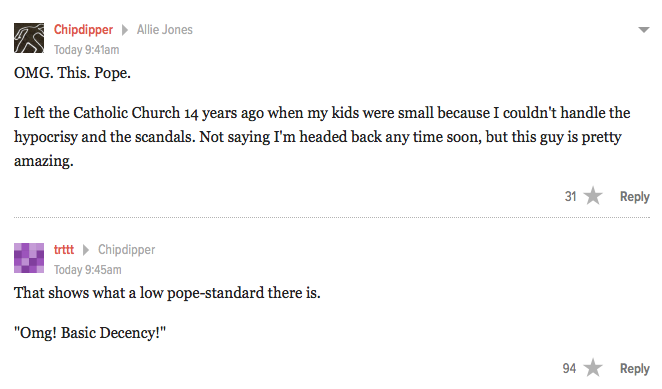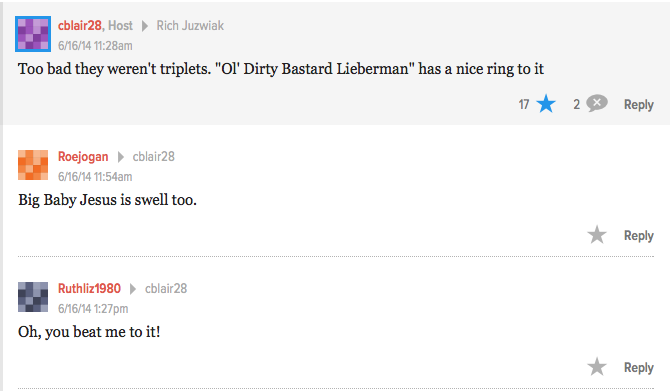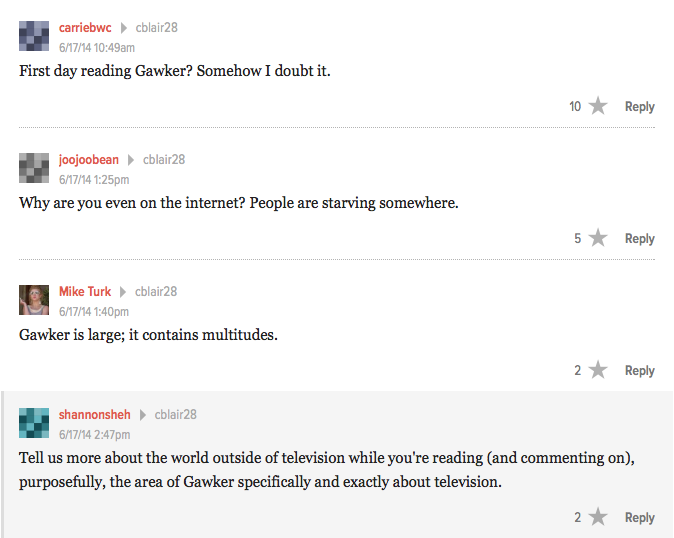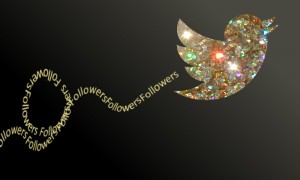The goal: Amass as many likes as possible. Get responses. Learn about Kinja’s audience through becoming an active member of it.
Before I tell you how I did it, let me say this: I tried many different tactics in this experiment to test what resonated with the Kinja crowd. I was curious to learn more about the motivations and the rhythms of its users. On different days, I took on different personas — some skeptical, some dark, some with quips a little edgy for the dinner table or the office. My comments didn’t necessarily reflect my political leanings. I freely admit to trying to stoke the flamers, so to speak.
The purpose of my experiment was to learn more about a commenting platform that Gawker’s founder hopes could profoundly influence how people have conversations online in an era in which media companies are agonizing a good bit about the discussions on their sites.
The first article I saw was from Gawker’s animals platform, about bears engaging in fellatio, a “weird-science” sort of story I later discovered was covered among some other mainstream media outlets, including NBC News.
I initially scoffed at the headline, but was not uncurious. I went with what I’d like to think was my better instinct and commented, “Why is this news?” I hoped fellow-minded individuals would agree that this is a somewhat ridiculous topic to write about, much less newsworthy.
I guess not. I got zero recommendations.
What if I turned up the dial?
As I scrolled through conversation after conversation on the platform, I noticed another characteristic among Kinja users: They are smart. And sometimes a little mean. Dark humor laced with truths that most people wouldn’t say win on Kinja.
On a recent article about the pope meeting with victims of clerical child abuse and asking for forgiveness, pope-praise garnered its fair share of likes. So did an observation about our “low pope-standard,” in which the public lavishes praise on even “basic decency.” 
I was looking for an opportunity to be edgy but truthful at the same time; become sort of a Kinja Louis CK, with his offbeat observations like the one about the origins of “wife beater” tank tops. Louis unpacks the worst of human behavior with humor. I spotted an article about shootings in Kenya that resulted in over 50 fatalities. I knew that gun violence is never funny, but felt like this was an opportunity to say something about the exorbitant amount of mindless violence perpetuated by our species across the globe.
Would people tear me apart for my hyberbole? Instead, the dark comment seemed to resonate. One person commiserated over the mindless tragedy experienced both in the United States and across the world, and 22 others starred the comment — in effect, giving it the thumbs up in agreement.
Kinja launched in 2012 and allows users to start their own discussion thread in response to an article, or reply to another thread. The idea is this: Instead of singular comments, you get discussions. The liveliest discussion threads are highlighted at the top of the feed, much like a “top comment” would be in a more traditional commenting system. Kinja-ers (not sure if there is an official name yet) can also recommend threads on social media, similar to liking a comment on Facebook.
As I developed a deeper understanding of the platform, I kept going.
Directly above the Kenya story, I spotted a recap of “The Real Housewives of Orange County,” a show for which I have an intense, severe hatred and, thus, no problem savaging for the purposes of riling up a virtual crowd. I commented: 
I was verbally stoned to death by the Gawker crowd.
My conclusion was that trashing “The Real Housewives of Orange County” won’t award you points on Kinja. It’s kind of like being a housewife on “The Real Housewives of Orange County”; even if you get a lot of attention, you still lose.
But what about trying to start a conversation? Maybe if I could get enough people to respond and start talking, I could skyrocket my discussion thread to the top.
In another article, William Shatner complained that there are too many “verified accounts” on Twitter. He didn’t want “nobodies” to become verified because it takes away the prestige of the verification. I gave it a shot.

It got two recommendations and five replies.
A couple of them agreed with me, explaining that though Shatner was being “so very, very Shatner,” he has a point. The top discussion thread for the article was a joke making fun of one of Shatner’s songs.
In my quest to master the platform, I sought comment from Executive Producer Rachel Rosenfelt (after being directed to her from Gawker’s public relations department) to learn more about how Kinja works; she declined.
It’s well-documented among those who cover digital media that Gawker wants Kinja to be a big deal. Founder Nick Denton has sunk serious resources into the platform; Capital New York has reported that Denton hopes Kinja will “reshape the very nature of online commenting.” Denton declined comment for this article.
The company also offers further motivations for users to post quality content in its commenting platform. Exceptional users of Kinja can be tapped to write for it and get paid, through what the company calls its “Recruits” program.
Gawker has thought carefully about the types of discussions it wants to unfold on Kinja. When Deadspin, Gawker’s sports publication, introduced Kinja to users in June of 2012, it said the commenting system isn’t necessarily geared toward having intense, intellectual debates all the time. “A joke followed by a round of virtual applause is, as far as Kinja is concerned, a lively discussion.”
Even competitors say it’s all about the audience. Jack Shepherd, editorial director at BuzzFeed, said, “I like that they put so much effort and love into trying to make something that really works for the community. I think the goals behind it are really noble and interesting.”
I kept studying Kinja’s users, next noticing their love for words. They like doing funny things with words. And they like tearing each other apart for how they screw up using words. (There were 95 likes recently for a user who ranted about the misuse of “eek” versus “eke.”)
I had to be extra careful about what I posted and found myself checking and double checking things as earnestly as I do before handing in a story to my editor.
Kinja users also like pop culture references. I tried to reference pop culture (very carefully) to further gain favor. I commented on an article about a man who allegedly named his twins “Ghostface” and “Raekwon” Lieberman, after the Wu-Tang Clan rappers. (“Ol’ Dirty Bastard” is another member of the Wu-Tang Clan. He’s also known as “Big Baby Jesus.”) 
The response to my Wu-Tang Clan joke was good, but not great. I was about to give up. I would never start a popular discussion, and I would probably be fired from my internship. Things looked bleak.
Then along came an article about Justice Anthony Scalia. He compared public displays of religion to “the playing in public of rock music or Stravinsky,” both of which he evidently does not enjoy but puts up with anyway. I saw the perfect opportunity to combine smart wordplay, dark humor and sarcasm. I commented, trying to emphasize just how ludicrous it was for him to make a comparison to the influential Russian composer from the early 20th century.
The numbers began to fly up, and so did my self-esteem. I sat and watched my notifications go crazy as people recommended and responded to my thread. Best of all, it spawned a bunch of clever responses, such as: 

The Stravinsky joke garnered the most recommendations of any thread I posted. I had done it. I was, for about 10 minutes, a Kinja star.
A few things I noticed while on my virtual adventure:
The only way to get a popular Kinja post is to be one of the first people to respond to an article. I found myself constantly refreshing Gawker’s home page to catch new articles as soon as they came out.
Because Kinja highlights discussions instead of individual comments, it’s often a task to scroll down and see later posts. The “top” discussion threads get an enormous amount of attention compared to the less popular ones.
Kinja doesn’t necessarily foster conversations. From what I’ve seen, most people only reply to the original post in a discussion thread. Sometimes there are a lot of replies, but rarely is there what could be called a real back-and-forth on the topic’s merits.
But, happily, for the most part, Kinja commenters appeared to be informed, grammar-enforcing and well-meaning Internet denizens; it is, for the time being, a safe and productive place to comment on anything but the Real Housewives of Orange County.















Leave a Comment